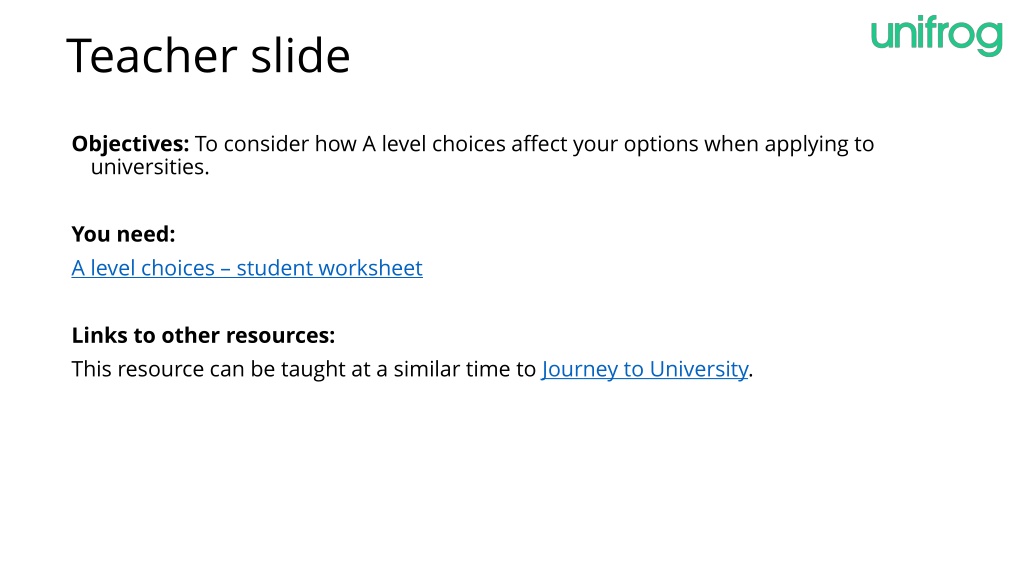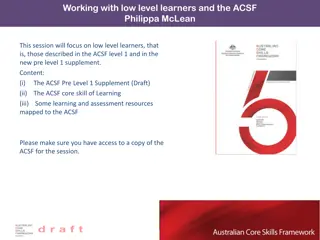Understanding A-Level Choices for University Applications
Explore the impact of A-level choices on university options. Learn how to make informed decisions based on your strengths, career goals, and university requirements. Discover the importance of selecting appropriate subjects for future degrees and the influence of facilitating subjects. Utilize resources and guidance to navigate the A-level selection process effectively.
Download Presentation

Please find below an Image/Link to download the presentation.
The content on the website is provided AS IS for your information and personal use only. It may not be sold, licensed, or shared on other websites without obtaining consent from the author. Download presentation by click this link. If you encounter any issues during the download, it is possible that the publisher has removed the file from their server.
E N D
Presentation Transcript
Teacher slide Objectives: To consider how A level choices affect your options when applying to universities. You need: A level choices student worksheet Links to other resources: This resource can be taught at a similar time to Journey to University.
Unifrog resources A level choices
A level choices The rationale behind choosing A levels will be different for everyone, however some good reasons to continue to study a subject, or to study a subject for the first time at A level are: - You have enjoyed and excelled at this subject in the past, meaning you believe you will achieve a high grade at A level - This subject will help you to progress in your chosen career - You have not studied the subject before, but you have thoroughly researched it and believe it will play to your strengths When choosing A level subjects, it is good to remember to: - Find out for yourself: there are always lots of rumours regarding subjects, their link to University etc but don t take these rumours for granted. A levels themselves, as well as what Universities and Apprenticeships are looking for, are changing - There is always a jump in expectations for A levels, but for some subjects this is even greater; make sure you have the skills and passion to achieve your potential - A level subjects have adapted; if you are choosing a new subject, thoroughly research it to make sure it is right for you
A level choices Your choice of A level can be very important for future degrees at University. Some University courses require specific A levels. Degree Music Art Art (or a design related subject) Pharmacy Chemistry, plus at least one from: Biology, Maths, Physics English English Literature and sometimes English Language also Geology/Earth Sciences At least 2 from: Maths, Physics, Chemistry and Biology Economics Maths for some courses (very rarely do you need Economics) Dentistry Chemistry and Biology usually Medicine Chemistry and either Biology, Physics or Maths, Biochemistry Chemistry and often one from: Biology, Maths or Physics A levels required Music Important note! This is a guide; all Universities will have different A level expectations, so always check the University website for admissions information.
Facilitating subjects Some subjects are required more often than others at University. This is because Universities believe that these subjects, called facilitating subjects, develop skills and knowledge relevant to numerous degrees. Some examples of facilitating subjects are: Maths and Further Maths English Literature Biology Chemistry Physics Geography History Languages (Classic and Modern) Universities do not necessarily require three facilitating subjects, some require two. Russell Group Universities often require students to have studied one or more facilitating subjects. Again, it is important to check each University s admission requirements. If you are unsure of what to study at University, these A levels keep your options open.
Is variety a good thing? When considering which A levels to choose, there isn't a straight yes or no as to whether you should choose subjects from a variety of areas. Choosing subjects you love is important, however choosing similar subjects is sometimes not what Universities want. For example London School of Economics and Political Science: the combination of business studies and economics as two separate A-levels is best avoided. If two subjects cover a similar curriculum, such as Economics and Business Studies, or Biology and Human Biology, then this could be an issue for Universities. Again, this is something to be aware of and to check each University s admissions expectations.
Is there anything not to study? Some Universities, and more likely specific courses, have A level subjects which they do not accept. Other Universities list A levels which they prefer . This will differ with each University and course. If your A level choices don t match up, you shouldn t necessarily discount the course, or be put off from taking subjects you are passionate in. Taking some of the subjects which are not on the preferred lists, as well as at least one of the facilitating subjects shouldn t be an issue (as long as the grades you gain are the correct standard). If choosing the subjects below, it is worth checking some University admissions criteria to see if they are accepted, and in conjunction with which other A levels. History of Art Economics Geology Law Media Studies Philosophy General Studies There are lots of rumours about these subjects, especially Media Studies, Law and General Studies, so always check the facts on University websites. Some Universities do accept Media Studies and Law, however General Studies is much less commonly accepted.
Where does this leave me? I have a few ideas about courses I would like to study I have no idea what course I would like to study I know what course I want to study Check multiple University websites to learn more about the course, modules and learning styles to make sure it is right for you. Check A level requirements from multiple Universities. If there are no specific required A levels, then consider choosing some facilitating subjects. Use the Unifrog tool to read about University courses you are considering, and the A levels required for these subjects. If a theme emerges, e.g many of the courses require Biology A level, then consider choosing this. Also, look at the A level course content for the facilitating subjects and consider choosing one or two of these which you feel confident you can get good grades in, and which you will enjoy. Read about the course content for facilitating A level subjects. Choose at least 2 facilitating subjects which you feel confident you can get good grades in, and which you will enjoy. Take advice from your teachers as well, they will know if you have an aptitude for a subject.
Instructions Use the Unifrog tool, as well as individual University websites, to complete your research into which A levels you should choose. Using the sheet provided, make 3 potential University course choices, and then list the A levels which you would choose to get onto this course, as well as the rationale behind choosing each A level.
Reflection -Is there one A level which is present in every University course choice? -What is the content for the potential A levels you have chosen? -Are you particularly interested in, or excelling at any of the facilitating subjects?
Sign in at: unifrog.org/student






















